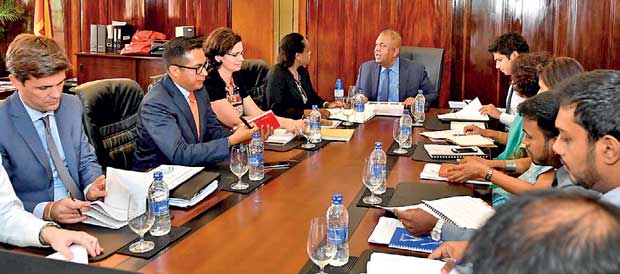13 Jul 2017 - {{hitsCtrl.values.hits}}

Sri Lanka is to receive US $ 1,340 million worth of financial and technical assistance from the World Bank Group for the three-year period starting from July 1, 2017, under the International Development Association (IDA) Transitional Support Facility.
Previously Sri Lanka received US $ 660 million IDA support for the 2014-2017 period. Sri Lanka is expected to access approximately US $ 300 million per annum for the coming three years from International Bank for Reconstruction and Development (IBRD). IDA and IBRD are member institutions of the World Bank Group.
This assistance comes as financial assistance for development projects and technical assistance for analytical and advisory services.
This was revealed when World Bank Country Director for Sri Lanka and the Maldives Idah Riddihough called on Finance and Mass Media Minister Mangala Samaraweera at the Finance Ministry on Tuesday. Riddihough discussed the progress of the World Bank- assisted ongoing and proposed projects in the country.
The Public Sector Efficiency Project and the Country Readiness for Public-Private Partnerships (PPP) are the two projects proposed to be implemented by the Finance Ministry with the financial and technical support from the World Bank.
The Social Safety Nets Project is the ongoing project with World Bank assistance.
Riddihough appreciating Sri Lanka’s economic performance said that despite significant challenges, it remained broadly satisfactory in 2016 and early 2017. The World Bank recognizes the corrective policy measures taken in 2016 following the expansionary fiscal and monetary policies implemented in the previous year as early signs of stabilization.
A combination of increase in revenues and rationalization of expenditures helped reducing the fiscal deficit from a reported 7.6 percent in 2015 to a 5.4 percent of gross domestic product (GDP) in 2016. While the boost received from increased profits and dividend income from state-owned enterprises (SOEs) played a key role in increasing revenues, the changes to the VAT Act implemented late 2016 and improved revenue administration helped strengthen the tax collection.
The World Bank predicts that the fiscal deficit in Sri Lanka is projected to fall to 5.2 percent of GDP for 2017. This is thanks to the impact of the value-added-tax (VAT) changes in its first full year. In outer years, the new Inland Revenue Act is expected to expand the tax base for corporate and personal income tax while shifting from tax holidays to a performance-based incentive regime, where the incentives depend on actual rather than promised investment.
On the expenditure side, the World Bank projects the increased fiscal space will benefit the primarily public investment, assuming no major additional recurrent expenditure commitments. Under this baseline, the fiscal deficit is to narrow to 3.5 of GDP by 2020. The primary fiscal balance is projected to become marginally positive in 2017.
10 Jan 2025 30 minute ago
10 Jan 2025 35 minute ago
10 Jan 2025 2 hours ago
10 Jan 2025 2 hours ago
10 Jan 2025 2 hours ago